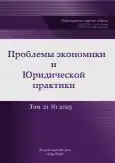Application of Event Thinking in Risk Management
- Authors: Turgaeva A.A.1
-
Affiliations:
- Financial University under the Government of the Russian Federation
- Issue: Vol 21, No 1 (2025)
- Pages: 241-245
- Section: Management
- URL: https://journal-vniispk.ru/2541-8025/article/view/289165
- DOI: https://doi.org/10.33693/2541-8025-2025-21-1-241-245
- EDN: https://elibrary.ru/ZXXGRY
- ID: 289165
Cite item
Abstract
Task. The article reveals the essence of the eventuality principle. The eventuality principle does not guarantee complete avoidance of risks, but allows the organization to be more prepared for possible events and minimize negative consequences. The application of this principle requires constant monitoring, adaptation and training. Events are presented as a management resource that must be understood how to use in risk management. The problem is the lack of a concept for applying the eventual approach to risk management. The subject of the study is a model of the eventuality approach to risk management of organizations. Model. A model of the eventuality approach to risk management of organizations has been formed. This work is built on the foundation of generally recognized scientific principles and works of both domestic and foreign scientists in the field of the eventuality approach. A set of general scientific methods of cognition was used as a research toolkit, including dialectical, complex and systemic approaches, as well as methods of scientific abstraction, comparative analysis, synthesis, modeling and decomposition. Conclusions. The eventual approach is an important component of an effective risk management system in organizations, allowing to prepare for various scenarios and minimize negative consequences. Practical value. The practical application of the eventual approach in risk management of organizations includes certain aspects related to the identification of potential events, assessment of probability and consequences, development of a response plan, monitoring and adaptation. Originality. Development of a model for the application of the eventual approach in risk management of organizations.
Full Text
##article.viewOnOriginalSite##About the authors
Aksana A. Turgaeva
Financial University under the Government of the Russian Federation
Author for correspondence.
Email: a_turgaeva@mail.ru
ORCID iD: 0000-0002-8374-1706
SPIN-code: 8718-4901
Cand. Sci. (Econ.), Associate Professor of the Department of Economic Security and Risk Management
Russian Federation, MoscowReferences
- Seklitova, L. A. Philosophy of Eternity: Contacts with the Higher Cosmic Reason / L. A. Seklitova, L. L. Strelnikova; Seklitova L. A., Strelnikova L. L. — Moscow: Amrita-Rus, 2004. — 397 p. — (Beyond the Unknown). — ISBN 5-94355-160-3. — EDN QXIQSN.
- Edinoverie. (Abridged version of the book «Philosophy of Eternity» by Seklitova L. A. and Strelnikova L. L. with Comments by Strizheva S. V.). — Proza.ru. : website. — https://proza.ru/2015/09/28/985. — (date of access: 10.02.2025). — Text: electronic.
- Clayton, K. Solving the Business Innovation Problem: How to Create a Growing Business and Successfully Maintain Its Growth / K. Clayton, R. Michael. — Moscow: Alpina Publisher, 2016. — 290 p. — ISBN 978-5-9614-4590-9. — EDN VRTCYL.
- Eric Ries «Business from Scratch. The Lean Startup Method for Rapidly Testing Ideas and Choosing a Business Model» / E. Ries. — 2014. — Alpina Publisher LLC
- Kleiner, G. B. From Enterprise Theory to Strategic Management Theory / G. B. Kleiner // Russian Management Journal. — 2003. — Vol. 1, No. 1. — Pp. 31–56. — EDN HTYFGX.
- Yanov, I. E. An eventual approach to human resource management for small and medium-sized businesses / I. E. Yanov // Fundamental and applied research in the cooperative sector of the economy. — 2011. — No. 5. — P. 35–38. — EDN RDMPEN.
- Dyubo, E. N. An eventual strategy for ensuring economic security of agro-industrial complex enterprises / E. N. Dyubo // Current state and priority areas for development of the agrarian economy in the context of import substitution: Proceedings of the international scientific and practical conference, Persianovsky, February 4, 2015 / Ministry of Agriculture of the Russian Federation, Department of Scientific and Technological Policy and Education, Don State Agrarian University; Editorial board: A. I. Klimenko, A. A. Gromakov, T. A. Miroshnichenko, T. N. Mishustina, S. V. Podgorskaya. — Persianovsky: Federal State Budgetary Educational Institution of Higher Professional Education «Don State Agrarian University», 2015. — P. 65–70. — EDN UJBNPV.
- Gudakova, L. V. Eventual econometric model of the monetary policy of the Russian Federation / L. V. Gudakova, E. D. Grebennikova, G. I. Foschan // Finance and Credit. — 2022. — Vol. 28, No. 4 (820). — P. 878–899. — doi: 10.24891/fc.28.4.878. — EDN VYEUMI.
- Afontsev, S. A. Global economic governance: new challenges and initiatives / S. A. Afontsev // Global governance: opportunities and risks / Department of Global Problems and International Relations of the Russian Academy of Sciences, Institute of World Economy and International Relations of the Russian Academy of Sciences. — Moscow: E.M. Primakov National Research Institute of World Economy and International Relations of the Russian Academy of Sciences, 2015. — P. 62–69. — EDN TZTFNX.
- Milskaya, E. A. Theory and Methodology of Strategic Management of Innovative Enterprises: specialty 08.00.05 «Economics and Management of the National Economy (by industries and areas of activity, including: economics, organization and management of enterprises, industries, complexes; innovation management; regional economics; logistics; labor economics; population economics and demography; economics of natural resource management; economics of entrepreneurship; marketing; management; pricing; economic security; standardization and quality management of products; land management; recreation and tourism)»: dissertation for the degree of Doctor of Economics / Milskaya Elena Andreevna. — St. Petersburg, 2012. — 374 p. — EDN QFNIWZ.
Supplementary files








